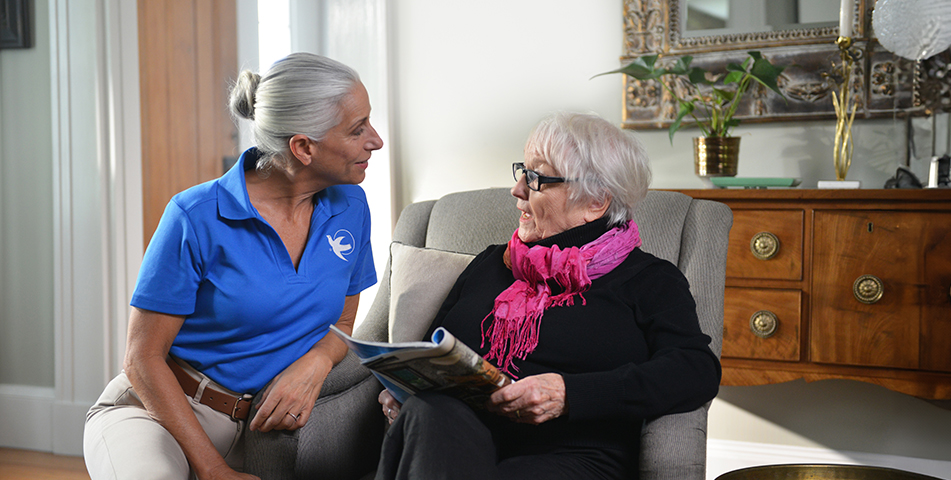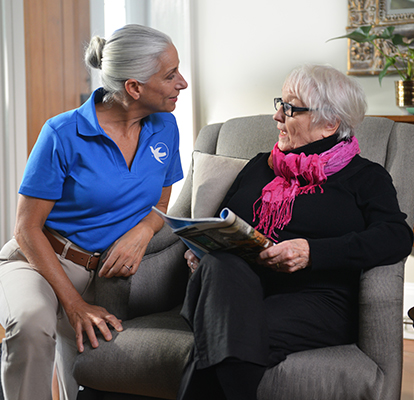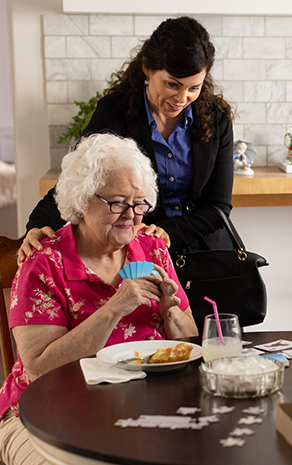




Alzheimer’s disease symptoms can affect nearly every aspect of daily life. You and your family may have to manage your loved one’s personality changes, safety concerns, and personal care such as bathing and dressing.
You don’t have to manage Alzheimer’s care alone.
Visiting Angels will help you create a comprehensive, personalized home care plan to address your loved one’s unique needs. We tackle daily caregiving responsibilities so you can focus on enjoying meaningful moments and making cherished memories with your loved one.
We will meticulously attend to your loved one’s well-being and tailor services to their specific requirements and the distinctive hurdles they face during each particular stage of Alzheimer’s disease.
Making decisions about in-home senior care for a loved one with Alzheimer’s can be overwhelming. At Visiting Angels, we have more than 25 years of experience in easing the transition through these life changes for families across the U.S.
Whether you are ready to begin with our specialized services right away or simply interested in learning more, we will make the process as easy as possible.



Making decisions about in-home senior care for a loved one with Alzheimer’s can be overwhelming. At Visiting Angels, we have more than 25 years of experience in easing the transition through these life changes for families across the U.S.
Whether you are ready to begin with our specialized services right away or simply interested in learning more, we will make the process as easy as possible.



Alzheimer’s disease is a progressive, degenerative brain disorder characterized by memory loss, cognitive decline, and behavioral changes. Symptoms worsen over time, usually over several years, and can have a severe effect on performing daily tasks and activities.
Alzheimer’s is considered a terminal condition, with an average life expectancy of 4 to 8 years after diagnosis, though some individuals live 15 or 20 years after their initial diagnosis.
Dementia is an umbrella term for a wide range of brain disorders that are characterized by memory loss. Alzheimer’s is the most common type of dementia. According to estimates, Alzheimer’s cases account for somewhere between 60% to 80% of all cases of dementia.
Everyone with Alzheimer’s has dementia, but not everyone with dementia has Alzheimer’s. People living with vascular dementia, for instance, have symptoms similar to Alzheimer’s but the cause of their dementia is different.
While scientists are still researching the exact cause of Alzheimer’s disease, researchers have identified a number of risk factors. The three biggest risk factors are:
Other risk factors include:
Most symptoms, particularly early signs of Alzheimer’s, are expressed through a person’s speech, thought patterns, and behaviors. The most prominent symptoms include:
Researchers believe the disease begins many years before signs appear. Symptoms typically start to appear in aging adults, though some cases of Alzheimer’s begin in a person’s 40s or 50s.
At first, symptoms will be mild and will have minimal impact on the person’s well-being. As the disease progresses, symptoms develop from mild to moderate to severe. By the final stages of the disease, the person may lose all short-term and long-term memory, the ability to speak and to understand speech, and the ability to perform basic personal activities, such as how to use the bathroom or eat on their own.
Currently, there is no known cure for Alzheimer’s disease, and its progress is believed to be irreversible. While researchers continue to search for a cure, modern treatments and clinical trials are working toward slowing disease onset, delaying symptoms, and reducing progression.
Doctors recommend that people at risk of or living with Alzheimer’s disease focus on healthy lifestyle choices, particularly focusing on cardiovascular health. Interventions such as improved sleep habits, increased omega-3 intake, and decreased stress are also proven to reduce the risk.
As Alzheimer’s progresses, people living with the disease need high levels of in-home memory care to ensure their well-being and safety. Friends or family members may care for your loved one with early and mid-stage Alzheimer’s. As the disease reaches its later stages, professional support is often needed.
Moving your loved one into a nursing care facility is an option. However, this can be a traumatic experience, and it is typically considered a last resort. Another option is to hire Alzheimer’s home care services, such as those offered by Visiting Angels. Our specialized home caregivers help people age in place with Alzheimer’s disease.
Visiting Angels offers services in assisted living and nursing home facilities. Because staff members at these facilities tend to look after more than one older adult during shifts, families decide to hire a professional caregiver to supplement the facility’s services. As needs change, we can increase the duration or frequency of care for your loved one, day or night.